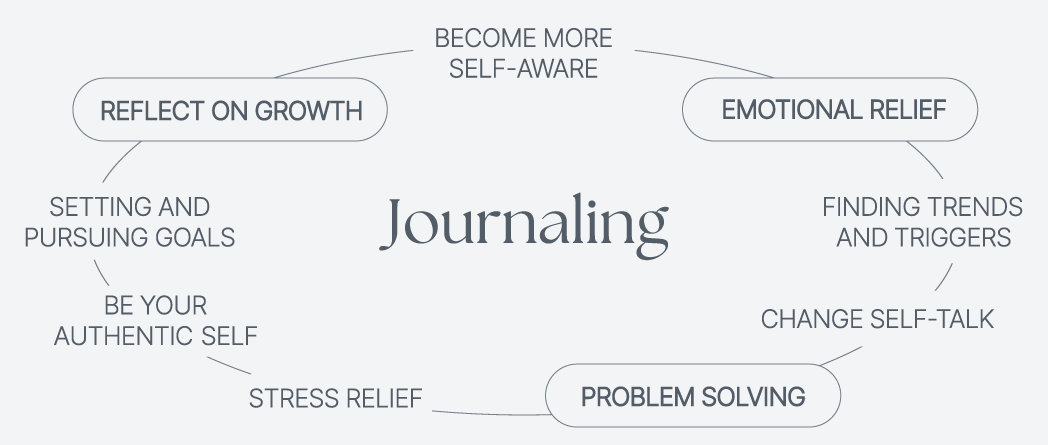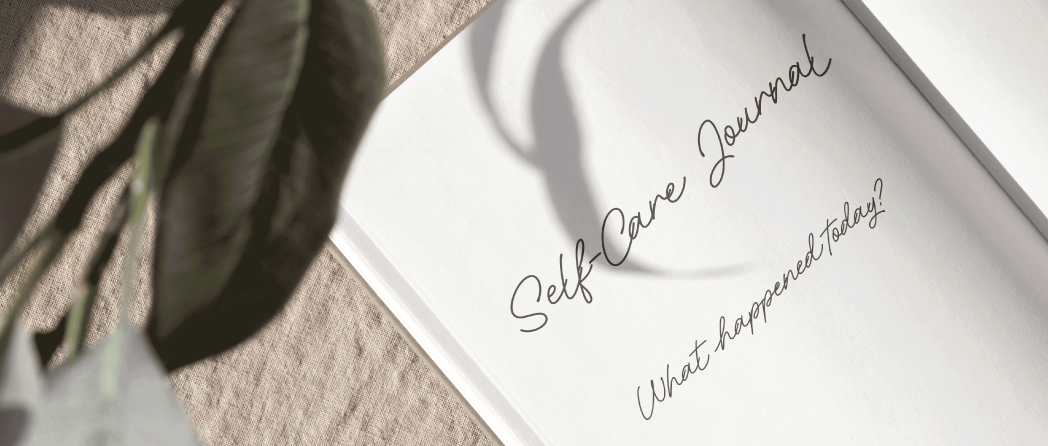Whether you’re coming back to journaling after a pause or trying it out for the first time, getting your feelings out of your head and onto paper has been linked countless times to an overall increase in feelings of balance and well-being. Keeping a journal is one single change that yields an enormous payoff.
For example, one study shows how participants reported higher resilience (the ability to adapt to difficult changes or events in your life), less perceived stress, lower anxiety, improved social integration, and better general well-being. Another study claims that journaling helps in “habitual acceptance”, which is enduringly accepting and not judging emotions and thoughts. This is a crucial skill in creating and maintaining better mental health and helping us react in more positive ways to stressors. Habitual acceptance was linked to improving “well-being, life satisfaction, and depressive and anxiety symptoms”.
Perhaps you’re interested in journaling for its power to help manage stress. One study found that participants who journaled about a stressful experience reported a decrease in their mental distress related to the event. If stress or stressful environments are a particular topic of interest for you, feel free to take TerraYou’s Stress Level test to gain insight into where your levels currently lie before getting started.
How journaling helps
Journaling can accompany you through life experiences both in and out of your control, and the reasons to add this practice to your life are wide-ranging. Keeping a journal helps you:
1. Become more self-aware: you gain perspective on the way you feel, helping shine a light on the depth and range of your emotions as well as possible blind spots in your views. Further, it can also help you work through conflict by putting yourself in the shoes of others, allowing you to gain more understanding, which helps in resolving the issue.
2. Emotional relief: journaling is the opposite of bottling it up. It’s a space to express and spend time with all your emotions, whether it’s joy, uncertainty, anger, fear, or a combination of all these and more. You’re able to explore each one, taking the time to examine your actions, reactions, and feelings about the situations around you.
3. Finding trends and triggers: keeping a record of events and the way you feel about them can reveal patterns in your thoughts and behaviors that allow you to make changes that positively affect your life. Whether it’s people, places, or anything else, you’ll better learn in which environments to spend more or less time.
4. Change self-talk: many of us don’t speak to ourselves with the level of compassion we should, and journaling can reveal these tendencies. Even further, it can train us to change the way we talk to ourselves by showing ourselves more love, understanding, and gratitude. It can also clarify that we are not our problems; our struggles are something that happens to us or around us.
5. Problem solving: making decisions can feel paralyzing when faced with difficult, uncomfortable choices. Journaling can help you work through the way you feel, what you wish the outcome to be, and what you can and cannot influence, giving you clarity over the situation and what you want to do about it.
6. Stress relief: journaling encourages mindfulness and being present in the moment. This combined with the time and space to pour all your emotions onto paper is an undeniable opportunity to alleviate emotional discomfort.
7. Be your authentic self: this is a place to say anything you want without judgement, punishment, or a score. You don’t have to hide how you feel or what you want, so let yourself be free here, not worried about spelling, grammar, or the eyes of others, and see what you discover about yourself.
8. Setting and pursuing goals: find something to work toward, monitor your progress, and celebrate your wins. Use your journal to think through what you want to do, whether your goals are realistic and fair to yourself, and what you must do to get there. You can also use the journal as a type of “documentation” of what you strove for and how you achieved it.
9. Reflect on growth: related to the above point, journaling is a great way to read back on your old sessions and contemplate the ways you’ve grown. Use this period of reflection to practice self-compassion and self-love by applying understanding where necessary and by taking time to congratulate yourself on your accomplishments, regardless how big or small.

Getting started
They say it takes about 66 days to form a habit, even if you miss a day here and there, and by setting a plan, you can smoothly reach those 66. Get yourself going by making your new habit as easy and accessible as possible.
Choose a journal and pen or pencil that makes you feel inspired. Keep these things close by and easily reachable so you don’t feel like you’re going out of your way to write. If it suits you better, use a phone app or computer program — though some people swear by using pen and paper because it allows you to slow your thoughts down and more easily settle into the moment. Feel free to give both a try, and choose whichever medium is going to best enable you to get your thoughts down.
Set a schedule. Starting out easy by journaling for two minutes or less can make this new activity feel much more do-able. Write every day at the same time — whether a specific time or something more flexible, like “before breakfast”. If journaling every day doesn’t feel right, adapt it to your needs by doing it 3-4 times a week instead, writing for longer periods.
Prepare a space where you can focus. Do your journaling somewhere you can be physically comfortable, with a supportive chair or plenty of pillows and blankets. Choose somewhere you can write undisturbed and feel unobserved. You want to create a space where you can both focus and let go, writing without hesitation or shame.
Open yourself up to different writing techniques. One option is free writing, which is sitting and letting the ink flow with whatever comes to mind. Or adding drawings to your journal can make it feel more representative of you and better express what’s in your mind. Consider adding photos or ticket stubs. This is your space and there are no rules! Alternatively, many people benefit from writing prompts. Whether abstract or concrete, these are a great way to get started — even if you end up steering away from the prompt. Here are a few examples:
What happened today? What do I think and feel about it?
What are one to three fears that tend to hold me back? What traits consistently help me push past those barriers?
What are five things I love about myself? How have I changed for the better in the last 1, 5, 20 years?
What’s blocking me from moving forward? If I could turn that into a person and talk with it, what would I ask it? What would I tell it?
When thinking back on a stressful event, what would I say to my past self to help them get through it? Is there anything in that message that helps me in this moment?

Building a new habit
There’s no wrong way to journal, and what you need — and what you get — from the process will likely change over time. Staying consistent to build a new habit is key, even while remembering that self-reflection and self-compassion is the goal. So on days when you want to journal, but something is standing in your way, rather than falling into guilt, try speaking your feelings aloud as a substitute. And remember that journaling works even better when accompanied by eating and sleeping well, meditating, talking with a therapist, and any other habits that serve you.
Letting go and sinking into journaling may take practice, but it offers balance and improved well-being once integrated into your life. If you’d like to explore other aspects of Balance in mental well-being, feel free to check out TerraYou’s other Balance tests, articles, and resources talking about Mindfulness, Ikigai, and more.



